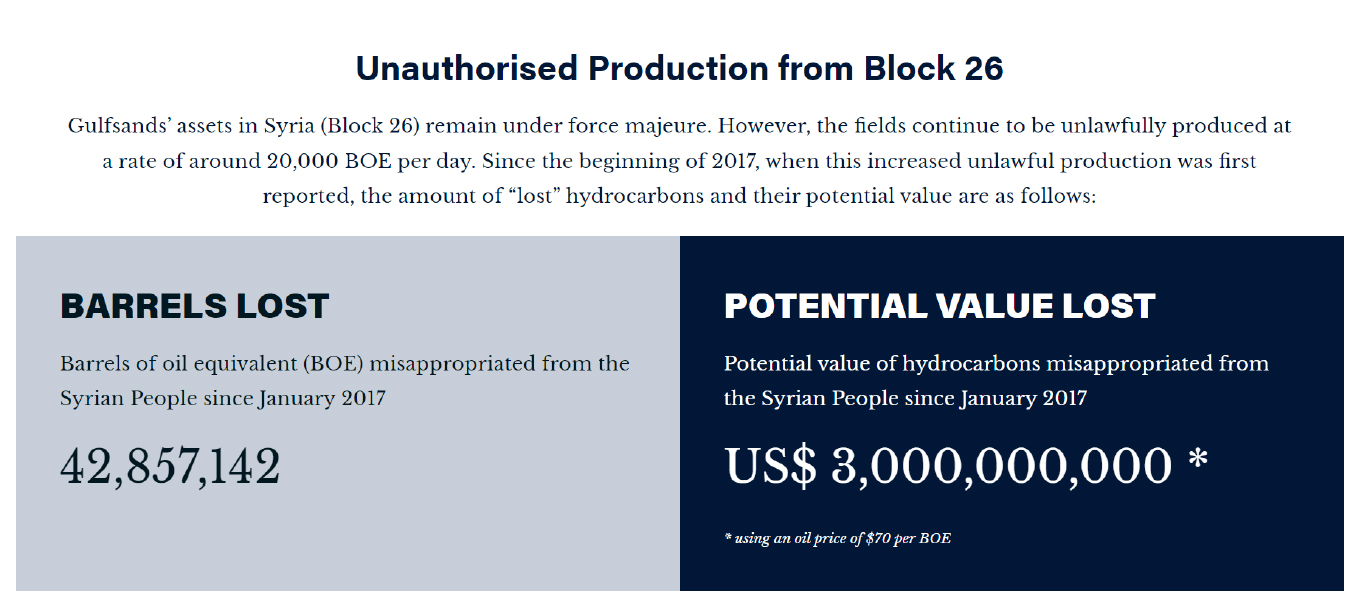
Unlawful oil production from block 26 surpasses US$3 BILLION
- Home
- /
- News
- /
- Uncategorized
- /
- Unlawful oil production from...
In early 2017 Gulfsands was informed that its Block 26 fields in North-East Syria, currently under force majeure in order to comply with UK sanctions, had been returned to significant and regular production – unlawfully.
We have subsequently become aware that the perpetrators of this illicit production were, and continue to be, entities affiliated with the self-proclaimed Autonomous Administration of North and East Syria (the “AANES”), the Peoples Defence Unit (“YPG”), the Syrian Democratic Forces (“SDF”) and the Syrian Democratic Council (“SDC”).
Today marks a sobering milestone: the estimated value of the hydrocarbons misappropriated since 2017 has surpassed US$3billion,

The illicit production from Gulfsands’ Block 26 assets continues at a rate of just under 20,000 barrels of oil equivalent per day, but this is just a portion of the total illicit hydrocarbon production taking place in the North-East of Syria. It is widely reported that production in this region is currently estimated to be around 80,000 barrels of oil per day. This means a lost value of approximately US$6.4 million per day (at current prices of around US$80 a barrel), and a total value of oil misappropriated since 2017 estimated to be around US$12 billion.
The biggest travesty of all is that only a minimal amount of this value finds its way to benefit the Syrian people. This unlawful oil trade takes place on the black market, away from regulation and oversight, meaning prices are depressed and the potential for corruption is high. The majority of this oil therefore benefits illicit actors, not the Syrian people. This also leads to unsafe, unregulated, and hugely environmentally damaging oil field practices which also have a catastrophic effect on the health of local communities.
It is immensely frustrating and disappointing that several influential countries appear to turn a blind eye to this illicit production which contravenes international law, sovereignty, international sanctions and the principles of UNSCR 2254.
This situation is not unique to Syria. Illicit oil trade is a global issue – the United Nations University World Institute for Development Economics Research (WIDER) estimates that illicit oil theft accounts for 5-7% of the global market for crude oil and petroleum fuel, valued at approximately US$133 billion each year. In some countries, including Syria, oil and gas are the main source of indigenous natural wealth. Illicit oil trade negatively impacts oil producing economies’ energy security, denies valuable revenue streams for its people and communities, prevents inward and outward investment, creates instability, and also damages both the local and global environment.
Project Hope
There is a desperate need for humanitarian and early recovery assistance in Syria, and the recent devastating earthquakes have only made the situation more acute. OCHA (the United Nations Office for the Coordination of Humanitarian Affairs) reports that 14.6 million Syrians are in need of aid, 90% live below the poverty line and 80% are assessed to be food insecure. It is also estimated that there are around 5.4 million people in need who are internally displaced within Syria and around 5.6 million Syrian refugees in neighbouring countries (Source: UKAid Syria Crisis response Summary – July 2022).
Gulfsands is pioneering a Humanitarian and Economic Stimulus initiative which would pave the way for international energy companies (which have all declared force majeure due to international sanctions) to return to operations in North-East Syria. Allocated revenues from oil sales would be deposited in an internationally administered fund and disbursed to finance early recovery, humanitarian and economic stimulus projects across the country – in line with UNSCR 2254 and for the benefit of all Syrian people who can, and should, benefit from their country’s national resource endowment to build self-sustainability and resilience for the future. We call this initiative Project Hope.
With investment and expertise, we estimate that hydrocarbon production in North-East Syria could be increased from 80,000 boepd to around 500,000 boepd and generate around US$15-20 billion per annum depending on the prevailing oil price. To put this into context, the US Government’s total funding available for the Syria humanitarian response in FY2021-22 was US$895 million (Source: USAID, “Complex Emergency Fact Sheet #7 FY22”- 6/10/2022), and the UK’s FCDO total funding in Syria during the crisis from Feb 2012 to March 2022 was £1.6 billion (Source: UKAid Syria Crisis response Summary – July 2022).
The Project Hope initiative has the potential to fund hundreds of medical and educational facilities and economic programs as well as create thousands of jobs.
Gulfsands continues to work to engage with international and regional stakeholders, including those from political, academic, humanitarian and civil society circles, to raise the profile of this issue and generate support for the Project Hope initiative.
If you are interested to hear more, follow Gulfsands on Linkedin and at the Company’s website https://gulfsands.com, where the ongoing unlawful production continues to be monitored and measured. Please let us know your views on our on Project Hope and the unlawful production.
About Gulfsands
Gulfsands Petroleum plc is an independent, public energy company, incorporated in the United Kingdom and focussed on growth in the Middle East and North Africa region. Its core asset is its interest in Block 26, a world class oil resource in North-East Syria, which is currently under force majeure due to UK sanctions.
Stay Up to Date
Connect with us on LinkedIn and Twitter


